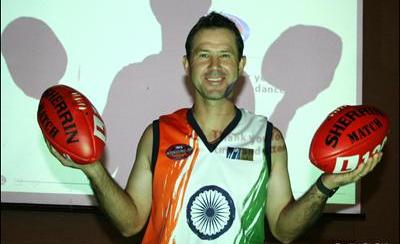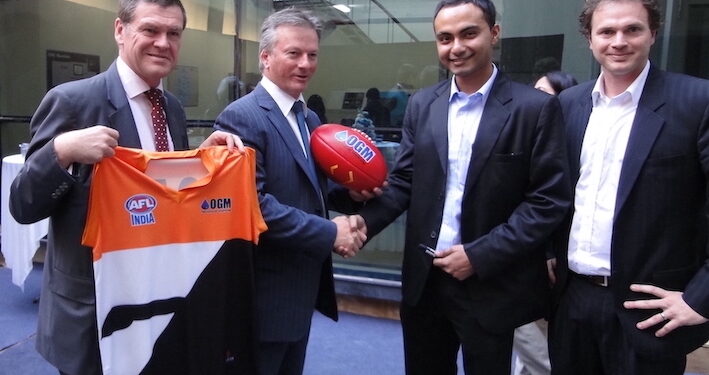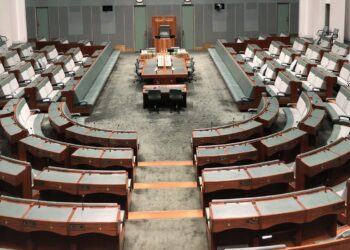When Ricky Ponting launched Australian Rules Football in Kolkata in 2008, few could have predicted that a teenage athlete named Sudip Chakraborty would go on to captain India’s first-ever AFL team and transform the sport into a powerful tool for cultural diplomacy.
Speaking with CEO Lisa Singh on the Australia India Institute’s Chats Over Chai podcast, Chakraborty revealed how AFL has grown from 150 players in West Bengal to more than 20,000 participants across 11 Indian states, primarily reaching underprivileged communities in rural villages and urban slums.
“Australian football is one of the most visually entertaining sports, one of the fastest outdoor team sports on earth,” said Chakraborty, who now works as India Engagement Adviser at the University of Melbourne. “When you watch a match, you do get hooked onto it, even if you don’t understand the rules.”
From Cricket Grounds to AFL Ovals
Chakraborty’s AFL journey began when the former Australian cricket captain formed a partnership to cross-promote Kabaddi and Australian football during the inaugural Indian Premier League season. At 18, Chakraborty was among 150 athletes selected to try the new sport.
His transformative moment came during the 2008 AFL International Cup in Melbourne, where he witnessed Lance “Buddy” Franklin score his 100th goal for the season at what was then Telstra Stadium.
“That entire atmosphere of people rushing onto the ground to congratulate him, that was the trigger,” Chakraborty recalled. “And then I also learnt that majority of the footies are made in India, up in the state of Punjab. So I was like, India’s got the cricket ovals, the footies are made in India. Why is India missing out on this amazing sport?”
Changing Lives Through Sport
For many Indian participants, AFL has provided life-changing opportunities. Players from remote border villages and Mumbai slums have travelled outside their communities for the first time to represent their states and country.
“Similar to soccer, with footy, you just need a football really to go out and play,” Chakraborty explained. “And also the weird nature of the ball, it bounces oddly, it attracts people.”
The initiative partners with not-for-profit organisations, including Magic Bus India Foundation—winner of the Laureus Sport for Good Award—to provide life skills education alongside sporting opportunities.

Building Cultural Bridges
AFL has become an unexpected diplomatic tool between Australia and India. Each year, 10-15 volunteers from Victorian community football clubs travel to India to help organise the National Championship, while several AFL clubs have embraced Indian connections.
Essendon Football Club supported the creation of Hume Bombers Football Club in Craigieburn, described as Australia’s first multicultural community football club. Richmond, GWS Giants, and Adelaide have all engaged in discussions about potentially playing matches in India.
“Sport obviously has a universal language, and we already had that connection between India and Australia through cricket,” Chakraborty said. “With the Indian diaspora growing in Australia, it worked both ways.”
International Success and Future Goals
As captain, Chakraborty led India to its first international AFL victory against East Timor in 2011. His playing career ended when he broke his arm during an India-Pakistan match in Melbourne while filling in as ruckman—though he maintains friendships with Pakistani players, highlighting sport’s power to transcend political boundaries.
Recently, India reached the semifinals at the inaugural AFL Asia Cup in Vietnam in November 2024, marking significant progress for the sport.
Looking ahead, Chakraborty believes the key to further growth lies in developing an Indian-origin player who can reach elite AFL levels in Australia, inspiring community engagement among the growing Indian diaspora.
“We need a player of Indian origin, either male or female, to reach the highest ranks, be a star player, and that will get the community behind the sport,” he said.
With nearly one million Indians now living in Australia according to the latest census, Chakraborty argues that AFL clubs need dedicated approaches to nurture multicultural talent, starting from Auskick age groups rather than adult introduction.
The AFL has launched initiatives including “AFL Desi” to engage South Asian communities, while Chakraborty sees opportunities for Australian sporting expertise to support India’s expanding professional sports leagues.
“Beyond just the sport, I feel the AFL industry has the best of the sport management, sport science professionals,” he said. “And there is a big demand and requirement for those skills in India with leagues getting formed for every other sport.”
From a teenager trying a new sport in Kolkata to becoming a cultural diplomat using AFL to bridge two nations, Chakraborty’s journey demonstrates how sport can transcend boundaries and transform communities on both sides of the Indian Ocean.











